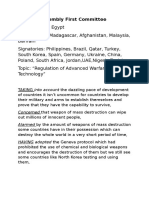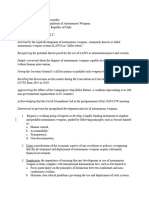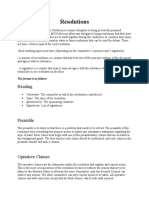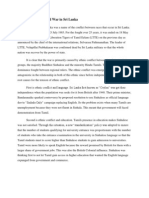Draft Resolution by The USA-Japan Bloc
Draft Resolution by The USA-Japan Bloc
Uploaded by
thiruspk70Copyright:
Available Formats
Draft Resolution by The USA-Japan Bloc
Draft Resolution by The USA-Japan Bloc
Uploaded by
thiruspk70Original Title
Copyright
Available Formats
Share this document
Did you find this document useful?
Is this content inappropriate?
Copyright:
Available Formats
Draft Resolution by The USA-Japan Bloc
Draft Resolution by The USA-Japan Bloc
Uploaded by
thiruspk70Copyright:
Available Formats
Committee: General Assembly 1st Committee -Disarmament and International Security
Committee (DISEC)
Agenda: Ethical Frameworks for the development and use of AI in weaponry
Sponsor: United States of America, Japan
Signatories: Republic of South Africa, Mexico, State of Libya, Australia, Republic of
Korea, Democratic Republic of Congo, Russian Federation, Yemen, Ukraine, Canada,
Federal Democratic Republic of Ethiopia, Ireland, State of Israel, France, Republic of
India, Saudi Arabia, Spain, United kingdom of Great Britain and Northern Ireland,
Lebanese Republic, Syrian Arab Republic, People’s republic of Bangladesh, Kingdom of
Sweden, Republic of Estonia, Kingdom of Netherlands, Argentine republic, Portuguese
republic, Socialist republic of Vietnam, Republic of Senegal,
The General Assembly,
Recognizing the rapid advancements in Artificial Intelligence (AI) with its dual use nature
and its applications in military technology, and the potential implications for global peace
and security,
Acknowledging the importance of maintaining international peace and security while
ensuring that technological advancements in AI are developed and used in compliance
with international law, including international humanitarian law and human rights law,
Reaffirming the principles enshrined in the Charter of the United Nations, including the
commitment to prevent the scourge of war and to promote peaceful relations among
nations,
Recalling previous resolutions on disarmament and the regulation of armaments,
including resolutions on Lethal Autonomous Weapon Systems (LAWS) and emerging
technologies in lethal autonomous weapons,
Saipem Classification - General
Use
Expressing concern about the lack of a comprehensive international framework
governing the ethical development and use of AI in weaponry, which could lead to
unintended escalations and destabilization,
Recognizing the need for a multilateral approach to address the ethical and legal
challenges posed using AI in military applications,
Acknowledging the importance of transparency and accountability in the development
and deployment of AI in military contexts,
Recognizing the potential benefits of AI in improving the precision and effectiveness of
military operations, while also emphasizing the need for responsible use,
Encouraging member states to collaborate on establishing international norms and
standards to govern the development and use of AI in weaponry,
1) Calls upon Member States to develop and adopt a comprehensive international
framework that governs the ethical development, deployment, and use of AI in
weaponry, considering the following principles:
a) Accountability: Ensuring that humans retain ultimate control and accountability over
the deployment and use of AI-enabled weaponry,
b) Transparency: Promoting transparency in the development and deployment of AI in
military applications, including clear communication of the capabilities and limitations of
such technologies,
c) Non-proliferation: Encouraging measures to prevent the proliferation of AI-based
weaponry to non-state actors and terrorist organizations;
Saipem Classification - General
Use
2) Urges all member states to establish national and international oversight bodies with
respect to previous conventions responsible for monitoring the development and use of
AI in weaponry, with the mandate to:
a). Monitor the ethical implications of AI in weaponry and recommend adjustments to
existing frameworks as necessary,
b) Facilitate dialogue and cooperation among Member States, the private sector,
academies, and civil society on best practices and emerging challenges such as the
development of LAWS;
3) Recommends the establishment of an UN-led International development society on AI
Weaponry (IDCAI), tasked with:
a) Conducting research on the ethical, legal, and security implications of AI in
weaponry,
b) Developing guidelines and best practices for the responsible development and use
of AI in military applications,
c) Providing technical assistance and capacity-building support to Member States in
developing national frameworks aligned with international standards;
4) Encourages member states to collaborate on updating existing international laws, such
as the Geneva Conventions and the CDUL, to address the unique challenges posed by AI
in weaponry;
5) Proposes the inclusion of ethical AI training in military education programs to ensure
that military personnel understand the implications of using AI in warfare;
6) Recommends the development of systems that require human authorization before
AI can engage in lethal actions;
Saipem Classification - General
Use
7) Recommends the initiation of public dialogues to educate and engage citizens on the
ethical implications of AI in weaponry;
8) Stresses the importance of compliance with the Law of Armed Conflict by ensuring
that any autonomous weapons system must be capable of distinguishing between
combatants and noncombatants, thereby minimizing harm to civilian populations;
9) Recommends the establishment of the International AI Commission of Weapon
Systems (IAICWS) to oversee compliance with these standards;
10) Invites all nations to ratify the Comprehensive Lethal Autonomous Weapon Systems
Organization (CLAWSO) to develop and implement measures ensuring transparency and
accountability in the use of LAWS, potentially merging its functions with those of the
IAICWS to streamline international efforts while agreeing to an internationally agreed
definition for LAWS with respect to the CDUL;
11) Stating the definition and uses of LAWS:
a) LAWS which are also known as Lethal autonomous weapon systems are the
latest development in Ai weaponry and these autonomous weapons that can
target and apply offence without any human oversight and have machine
learning technology which enables them to learn from their past errors,
b) These weapons can be used in the place of human soldiers and other kinds of
weaponry as they are believed to be more efficient and are said to be more
ethical as this is said to result in decrease of death toll by some degree;
12) Urges all countries to support regulation of using and developing LAWS;
13) Recommends creating a code of ethics as it outlines the values and principles that AI
systems should follow;
14) Proposes the ‘Accountability of misuse of conventional weapons protocol’ which
aims to:
Saipem Classification - General
Use
a) In the case of human causalities or violation of the CCW, thus this protocol aims to
fine a penalty or having their head of state be questioned by international investigating
bodies,
b) This protocol will also include ‘The prevention of misuse of autonomous weapon’
clause which prevents the misuse of autonomous weapons with respect to the CDUL and
also that the states need to send the data of LAWS development;
15) Recommends an international regulatory body to be established following the
developments of LAWS and keep monitoring developments while ensuring that human
oversight gets implemented in autonomous weapons;
16) Further proposes the addition of Humane decision accountability license (HDAL)
which needs to tested in autonomous weapons to see if they have Human decision
making capability with human oversight and all developed autonomous weapons need to
be certified with the HDAL;
17) Further requests all member states to have an official autonomous weapon testing
grounds or the Autonomous weapon testing office (AWTO) which can confirm whether
an autonomous weapon can be certified.
Saipem Classification - General
Use
You might also like
- DPAR 2023 Wef 01.08.2023Document85 pagesDPAR 2023 Wef 01.08.2023Project Manager IIT Kanpur CPWD92% (12)
- Special Power of AttorneyDocument2 pagesSpecial Power of AttorneyNeelam Shujahuddin75% (4)
- Wa0032Document4 pagesWa0032thiruspk70No ratings yet
- Wa0001Document6 pagesWa0001thiruspk70No ratings yet
- Working PaperDocument4 pagesWorking PaperSoorya PNo ratings yet
- Laws For LAWSDocument3 pagesLaws For LAWShhhNo ratings yet
- Draft Resolution 5.0Document2 pagesDraft Resolution 5.0daveymilan36No ratings yet
- GYLS Sample 3Document7 pagesGYLS Sample 3sanjit75204No ratings yet
- jmc mun 2024Document3 pagesjmc mun 2024aayushchoraria11No ratings yet
- DocumentDocument4 pagesDocumenthamouda7ahmedNo ratings yet
- PositioDocument10 pagesPositioabahuguna2007No ratings yet
- MUN LibyaDocument5 pagesMUN LibyaLeanna MassarNo ratings yet
- Draft Conconlusions April2023ggeDocument4 pagesDraft Conconlusions April2023ggeBhavan SaiNo ratings yet
- POWERPOINT - AI and Armed ConflictsDocument34 pagesPOWERPOINT - AI and Armed ConflictsGengisWolffNo ratings yet
- Draft Resolution 1.1Document2 pagesDraft Resolution 1.1punnyakhemaniNo ratings yet
- PP Disec IndonesiaDocument2 pagesPP Disec IndonesiachampionNo ratings yet
- Resolution Space (IVMUN 2020)Document4 pagesResolution Space (IVMUN 2020)hayamoloo0408No ratings yet
- Mcmun PDDocument6 pagesMcmun PDsanjulav11No ratings yet
- DR ChinaDocument2 pagesDR China47x9bw5tpqNo ratings yet
- Position Paper - DPRKDocument2 pagesPosition Paper - DPRKfaiyazrashid648No ratings yet
- Draft RESOLUTIONDocument8 pagesDraft RESOLUTIONaman.ishratiNo ratings yet
- Indian DRDocument3 pagesIndian DRsrinikeshdurgavajjulaNo ratings yet
- DR TRIPLE DEFENDERSDocument6 pagesDR TRIPLE DEFENDERSgaceituno.20No ratings yet
- Draft Resolution (Pink City)Document4 pagesDraft Resolution (Pink City)bakersi.o2009No ratings yet
- Draft Res 1.0Document5 pagesDraft Res 1.0Harshil WaliaNo ratings yet
- Resolution 420 - 69Document3 pagesResolution 420 - 69Cubing, D.I.Y n moreNo ratings yet
- Treaty DraftDocument3 pagesTreaty DraftShubham MoreNo ratings yet
- 2 FORUM: General Assembly 1 Main Submitter: India CO-SUBMITTERS: Bolivia, Morocco, Democratic People's Republic of KoreaDocument3 pages2 FORUM: General Assembly 1 Main Submitter: India CO-SUBMITTERS: Bolivia, Morocco, Democratic People's Republic of KoreaMinh VuNo ratings yet
- Draft Res 1.0Document5 pagesDraft Res 1.0Harshil WaliaNo ratings yet
- DSMUN Better Bloc ResolutionDocument8 pagesDSMUN Better Bloc Resolutionaashna kumarNo ratings yet
- Draft Resolution Freedom of Speech - USA (UNHRC)Document4 pagesDraft Resolution Freedom of Speech - USA (UNHRC)suryomaroraaNo ratings yet
- Plop Plop Resolution GoatDocument3 pagesPlop Plop Resolution GoatronitbaskaranNo ratings yet
- FranceDocument3 pagesFrancehamouda7ahmedNo ratings yet
- Artificial Intelligence in Conflict ZonesDocument2 pagesArtificial Intelligence in Conflict ZonesMinh VuNo ratings yet
- DISEC Topic-2 ResoDocument3 pagesDISEC Topic-2 ResoJayakumar SankaranNo ratings yet
- Background Guide DisecDocument21 pagesBackground Guide DisecManjunath RaoNo ratings yet
- Commission Guide - LAWSDocument8 pagesCommission Guide - LAWSexcruciatingNo ratings yet
- NDSA Topic 2Document4 pagesNDSA Topic 2hamouda7ahmedNo ratings yet
- Resolutions For Unmanned WeaponsDocument2 pagesResolutions For Unmanned Weaponsemilyan13No ratings yet
- BG Disec IIIDocument15 pagesBG Disec IIIHyder Husain ArastuNo ratings yet
- GA1 - 2 - CanadaDocument3 pagesGA1 - 2 - CanadaMinh VuNo ratings yet
- 10 Reasons To Ban Killer Robots: Ethical ConcernsDocument2 pages10 Reasons To Ban Killer Robots: Ethical ConcernsShehryar MazharNo ratings yet
- Draft ResolutionDocument24 pagesDraft Resolutionharshinikalakuntla09No ratings yet
- Issue 1Document3 pagesIssue 1nguyenquynhhan028No ratings yet
- icrc_position_on_aws_and_background_paperDocument12 pagesicrc_position_on_aws_and_background_paperkhadijahabib786000No ratings yet
- Bio-Chem Weapons Resolution (Approved)Document8 pagesBio-Chem Weapons Resolution (Approved)Hong Kong MUN 2013No ratings yet
- Laws: Lethal Autonomous Weapon SystemsDocument6 pagesLaws: Lethal Autonomous Weapon SystemsabhasNo ratings yet
- Resolutions tcm18-145525Document7 pagesResolutions tcm18-145525khushiNo ratings yet
- Draft ResolutionDocument4 pagesDraft Resolutionteppecennet296No ratings yet
- Mun helper AMDocument1 pageMun helper AMchiaalb13No ratings yet
- Draft Resoultion - English or Spanish-1Document3 pagesDraft Resoultion - English or Spanish-1steyvaanbabyNo ratings yet
- Legal Review of Lethal Autonomous WeaponsDocument5 pagesLegal Review of Lethal Autonomous WeaponsgfournierNo ratings yet
- HFCMUN Working PaperDocument2 pagesHFCMUN Working PaperjaydenrburrowsNo ratings yet
- 20200831-Portugal1Document7 pages20200831-Portugal1airfcivtvcqcrxjbhsNo ratings yet
- Draft Resolution 4.0Document3 pagesDraft Resolution 4.0Siya AgrawalNo ratings yet
- GallantryDocument11 pagesGallantrySLIZZ IS LIVENo ratings yet
- MUN Simultion: Draft Resolution On Nuclear SafetyDocument7 pagesMUN Simultion: Draft Resolution On Nuclear SafetyJohn Hajjar Drikha100% (1)
- ATT enDocument13 pagesATT enMesfin KebedeNo ratings yet
- Chapter-1-Safety-Oversight-Obligations-May-2021-1 3Document117 pagesChapter-1-Safety-Oversight-Obligations-May-2021-1 3Tariq khosoNo ratings yet
- DR Unsc1.0Document3 pagesDR Unsc1.0nishantNo ratings yet
- Ismun2.0 Disec BGDocument15 pagesIsmun2.0 Disec BGmoksha111109No ratings yet
- Working Paper 2.0Document1 pageWorking Paper 2.0thiruspk70No ratings yet
- PVM Mun ListDocument4 pagesPVM Mun Listthiruspk70No ratings yet
- Working Paper v1Document2 pagesWorking Paper v1thiruspk70No ratings yet
- Tour InstructionsDocument4 pagesTour Instructionsthiruspk70No ratings yet
- Morated Cacus Topics For DisecDocument1 pageMorated Cacus Topics For Disecthiruspk70No ratings yet
- Osama Bin Laden DeathDocument22 pagesOsama Bin Laden DeathRishan MehmiNo ratings yet
- City of Manila v. Laguio, Jr.Document4 pagesCity of Manila v. Laguio, Jr.Noreenesse SantosNo ratings yet
- Legal Mandates To Land Use PlanningDocument39 pagesLegal Mandates To Land Use Planningivy jane estrellaNo ratings yet
- Constitutionalism - A Preliminary DiscussionDocument13 pagesConstitutionalism - A Preliminary DiscussionNoah CristNo ratings yet
- Tabligh MovementDocument4 pagesTabligh MovementZulqarnain RamliNo ratings yet
- Fostering Autonomy and IndependenceDocument12 pagesFostering Autonomy and Independenceapi-247799595No ratings yet
- Business CommunicationDocument2 pagesBusiness Communicationabdul wajidNo ratings yet
- Crossing The Rubicon, 49 BC PDFDocument4 pagesCrossing The Rubicon, 49 BC PDFcfeauxNo ratings yet
- 10 Principles of Catholic Social TeachingDocument2 pages10 Principles of Catholic Social TeachinginamalaeyaNo ratings yet
- Zbornik NKVD enDocument406 pagesZbornik NKVD enAntony Quispe100% (1)
- Administrative Investigations and Appeals: GR No. 160791 - Sales v. Carreon JRDocument1 pageAdministrative Investigations and Appeals: GR No. 160791 - Sales v. Carreon JRjci028No ratings yet
- 0117 Ira PDFDocument119 pages0117 Ira PDFpavel_dan2002No ratings yet
- San Pablo v. Pantranco South Express, Inc. (1987)Document2 pagesSan Pablo v. Pantranco South Express, Inc. (1987)Ish GuidoteNo ratings yet
- Final Synthesis EssayDocument4 pagesFinal Synthesis Essayapi-489840991No ratings yet
- Causes That Led To Civil War in Sri LankaDocument3 pagesCauses That Led To Civil War in Sri Lankamyra_edora_2No ratings yet
- Civic G-11 Final ExamDocument2 pagesCivic G-11 Final Examahmed mohammedNo ratings yet
- Counter AffidavitDocument5 pagesCounter AffidavitTim PuertosNo ratings yet
- What Is The Difference Between Tax and CessDocument2 pagesWhat Is The Difference Between Tax and CessRavindra SimpiNo ratings yet
- PNB V CedoDocument2 pagesPNB V Cedoralph_atmosferaNo ratings yet
- 18 U.S. Code 1519 - Destruction, Alteration, or Falsification of Records in Federal InvestigationsDocument4 pages18 U.S. Code 1519 - Destruction, Alteration, or Falsification of Records in Federal InvestigationsBaqi-Khaliq Bey100% (1)
- Answer Sheet 6 - GSP22T06S-7brzvpDocument35 pagesAnswer Sheet 6 - GSP22T06S-7brzvprohit95patnaNo ratings yet
- Preliminary QuizDocument2 pagesPreliminary QuizKendrick RomeroNo ratings yet
- Linsangan v. Tolentino, 598 SCRA 133Document48 pagesLinsangan v. Tolentino, 598 SCRA 133Marianne DomingoNo ratings yet
- Comparison of Criminal and Financial Details of Re Elected MPs in Lok Sabha 2014 ElectionsDocument85 pagesComparison of Criminal and Financial Details of Re Elected MPs in Lok Sabha 2014 ElectionsOutlookMagazineNo ratings yet
- Republic of The Philippines Region XI Tagum City Mankilam, Tagum City Tel - No. (084) 216-6506 Fax No. (084) 216-6497Document3 pagesRepublic of The Philippines Region XI Tagum City Mankilam, Tagum City Tel - No. (084) 216-6506 Fax No. (084) 216-6497Raymart EstabilloNo ratings yet
- CTA Case BPI V CommissionerDocument2 pagesCTA Case BPI V CommissionersaintkarriNo ratings yet
- Second World War AtestatDocument24 pagesSecond World War AtestatAdrian UdvuleanuNo ratings yet
- Art 29-30Document19 pagesArt 29-30Aayushi TomerNo ratings yet






























































































